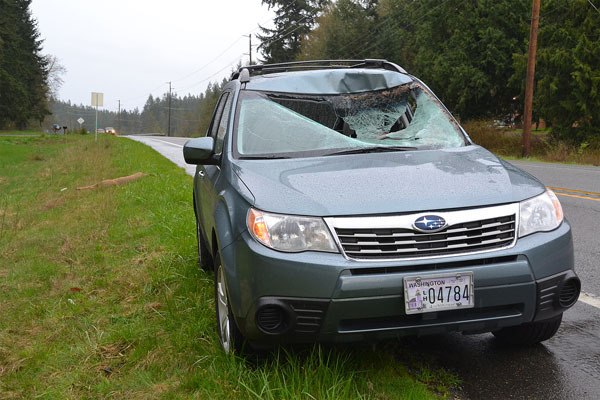If you hit and kill it, now you can eat it.
Starting July 1, motorists can legally salvage deer or elk killed in motor vehicle accidents in a new rule that was recently approved by the Washington Fish and Wildlife Commission. Washington joins nearly 20 other states, including Idaho and Montana, that allow the public to salvage road kill wildlife under various guidelines. While other states permit the salvaging of just about any animal, such as porcupines or foxes, Washington residents will be restricted to salvaging just deer and elk. Only elk will be permitted for salvaging in Clark, Cowlitz and Wahkiakum counties due to federal laws regarding endangered Columbian white-tailed deer.
There are also some hoops to jump through and provisions to be aware of before motorists can begin legally utilizing the rule.
Legal provisions include obtaining a free salvage permit within 24 hours of taking possession of a deer or elk killed in a motor vehicle collision; removing the entire carcass, including entrails, of the animal from the road right of way; not killing an injured elk or deer that is found in order to get a salvage permit; not using big game licenses and tags in lieu of a salvage permit for deer or elk killed in a motor vehicle collision; only law enforcement officers or individuals authorized by fish and wildlife may euthanize a deer or elk injured after a motor vehicle collision.
Motorists should also be aware of the implications of taking meat that is unfit for consumption. The department implicitly states that individuals who salvage and consume the meat do so at their own risk and that it cannot guarantee the quality or safety of the meat. A safety guideline can be found on its website at http://wdfw.wa.gov/hunting/meat_safety/.
“More than anything, your nose will tell you,” Fish and Wildlife spokesman Craig Bartlett said.
The rule change was championed by Fish and Wildlife Commissioner Jay Kehne. Bartlett added that the rule change was a point of discussion for several years but picked up momentum after a public hearing on the subject.
“There’s been interest expressed in being able to recover road kill animals for some time,” Bartlett said.
Bartlett felt the rule change will help in removing hazards from the road and utilizing meats that would otherwise be wasted.
According to Fish and Wildlife, 3,000 deer and elk are killed on state highways by motorists each year. The rate of collisions is especially high on Whidbey Island along Highway 20 and 525, in the Packwood-Randle area on U.S. Highway 12 and on I-90 near North Bend.
The Washington State Department of Transportation’s crash data portal showed that Island County reported 75 wildlife-involved crashes in 2015. Of the 75, 40 occurred on the state routes.
Kitsap County, which has more than double the total population of Island County, had only 53.
Ben Jacobson-Ross, a hunter who lives in Clinton, saw a number of pros as well as cons with the rule. The benefits, in his eyes, include ensuring an animal’s death doesn’t go to waste, utilizing a cheap source of nutritious meat for people who otherwise may not be able to afford it and that it could encourage reconnection with the food chain. He said there is often a disconnect with people’s understanding of what the general population consumes and where it comes from.
As it turns out, deer meat is even more nutritious than a top-round beef steak. While a one-ounce steak contains 57 calories, seven grams of protein and three grams of fat, venison of the same size has 52 calories, seven grams of protein and two grams of fat, according to SELF Nutrition Data.
“It’s very nutritious meat,” Jacobson-Ross said. “By making this legal, it will make it more readily available for people who don’t have the skills, knowledge or funds to go out and hunt for themselves.”
Jacobson-Ross felt the biggest problem could be people’s lack of understanding with the dangers of handling the meat. If not managed properly, bacteria such as e.coli can present a real threat.
Another con could be people purposely hitting the animals to collect both the free meat and insurance claims, he said, and the law change won’t reduce the number of deer hit on roadways.
Freeland resident Duane Spangler also supports the rule change, and will be among those to take advantage of it if he ever strikes a deer. He agreed with Jacobson-Ross in that people should be aware of the dangers in salvaging unsafe meat, and that they should only pick it up if they personally witness the collision.
“Most road kills are so badly beat up that the public needs to know that they might be so battered up that they’re not even worth it,” Spangler said. “If it was hit in the head and the rest of the body is not damaged, I would probably pick that sucker up and skin it out and gut it and let it hang for a while and then cut it up, then put in a freezer.”
Bartlett said the department reached out to the states where the rule is legal with similar concerns as Jacobson-Ross pointed out. They found that people abusing the rule was rare, and that insurance claims weren’t all that high.
“They said so far as they know it hadn’t emerged as a major problem,” Bartlett said.
Overall, Jacobson-Ross felt the pros outweigh the cons.
“It’s about the animals not dying a needless death,” Jacobson-Ross said. “It might not be the juiciest steak if you’ve ever had, but at least you’re eating.”


